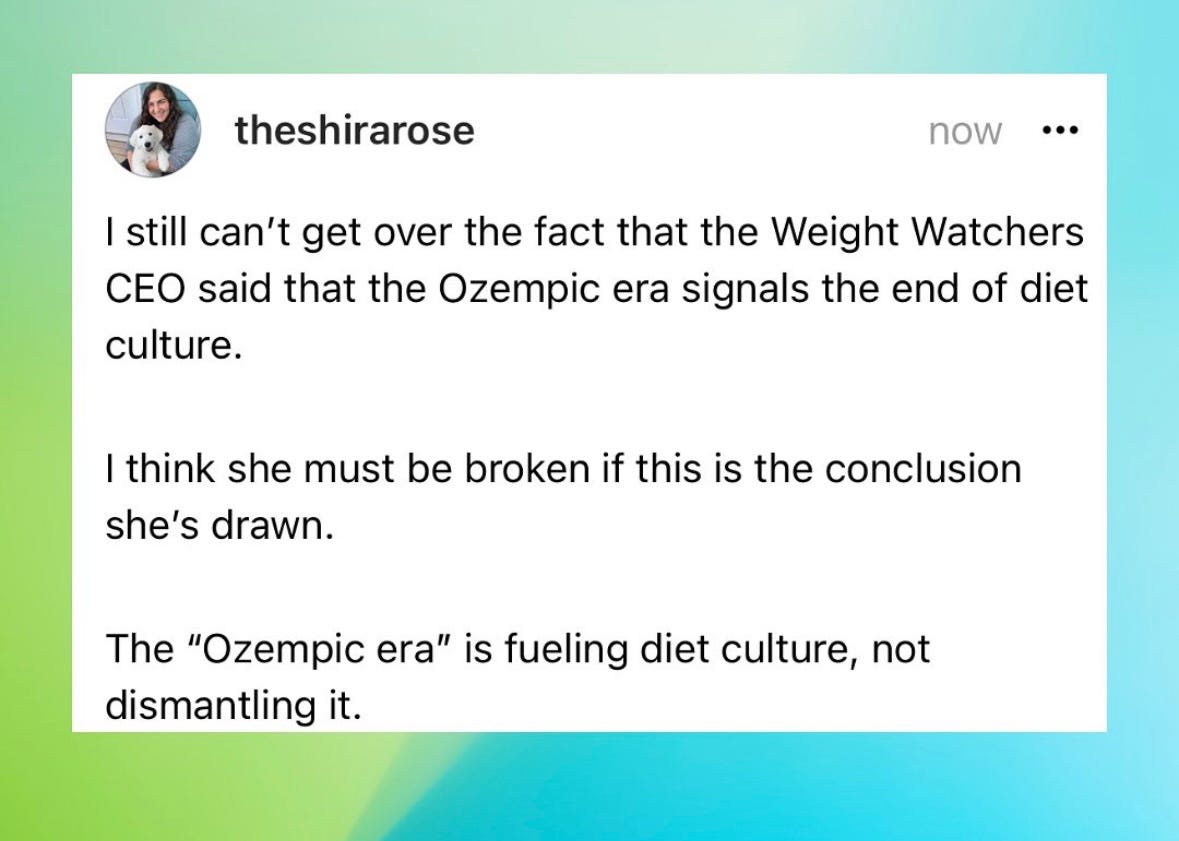You’re not fooling anyone, WeightWatchers
Call yourselves whatever you want, you’re still spreading fatphobia 🙃
Last Monday night, ABC aired a prime-time special hosted by America’s Mom, Oprah, called Shame, Blame and the Weight Loss Revolution.
I didn’t watch the special. I’ve spent enough hours of my life wondering what Weight Watchers, Oprah, and the weight loss industrial complex would think of my body. But from what I’ve read, the special, “focused on the recent wave of weight-loss drugs like Ozempic and Wegovy and saw Oprah talk candidly about her own experience trying to lose weight.”
Katie Sturino, author of Body Talk and body acceptance advocate, shared her opinions of the WeightWatchers special on Instagram calling out the CEO of WeightWatchers for getting “so close to apologizing on behalf of WeightWatchers…for saying, ‘We really got this wrong and we’re sorry for saying it’s just willpower and that one body is worse than the other.’”
The CEO, Sima Sistani, has since directly apologized to Katie in this moving reel. And also…it’s not that simple.
Like millions of people (and millions of millennials), I have a complicated relationship with WeightWatchers.
My first foray into point-counting was in May 2002; the summer between my freshman and sophomore year of college. I’d been steadily gaining weight and unfortunately for me, I attended the University of Miami, which my Dad jokingly referred to as the University for Central Casting. Every female student looked like Sophia Vergara or Sydney Sweeney or a hybrid of the two. I felt like a troll.
So that summer, at the age of 19, I decided to join WeightWatchers. My Mom joined, too, making it an official team effort. Together we spent the summer counting points, asking for Frappuccino Lites and dining on 6” Subway turkey sandwiches with mustard instead of mayo. Without cheese. I still ask for pretty much everything without cheese and I have no idea if it’s because I don’t like cheese or if I trained myself not to like cheese.
In a few short months, I lost close to 30 pounds. I went back to college feeling more confident in my spaghetti straps and “going out tops” than I ever had before. It worked! Weight Watchers had worked!****
***Until I stopped counting points and gained all the weight back PLUS SOME. Tale as old as time.
So, yeah. I couldn’t watch the special. My feelings about Oprah and her weight loss journey/obsession/exploitation is too much for my fraught nervous system to handle.
However, I’m also extremely curious about brands and how they respond to cultural shifts in language, norms, and backlash…and I’ve been watching from the sidelines with my fully-buttered popcorn (45 points) to see how WeightWatchers responds to the body positivity movement and how younger generations in the U.S. feel about diet culture and fatphobia.

WeightWatchers has taken a financial hit since before the pandemic, reporting an annual revenue of just $889.6 million for 2023, significantly down from its high of $1.4 billion in 2019.
All this despite:
Rebranding itself as WW International in a pathetic attempt to distance itself from the diet culture it helped create, fooling exactly no one
Releasing a new app, Kurbo by WW, designed for kids aged 8-17 which taught them that avocados and peanut butter were “red light foods.” The app would later be slapped with a $1.5 million fine by the FTC for illegally collecting kids’ personal information without their parents’ permission. Cool!
A full-course marketing press against pandemic weight-gain in 2020 and 2021
Using co-opted language that panders to the very people they are trying to attract
Their current strategy: purveying weight loss drugs…
And asking influencers to promote products they’ve never tried
In March 2023, WeightWatchers drove its stock up once again by purchasing Sequence, a telehealth platform that allows doctors to prescribe Wegovy, Zepbound, and other weight loss drugs.
Whether we like it or not, Ozempic and these other prescription weight loss medications have gone mainstream. Once reserved for Real Housewives, these prescriptions are no longer aspirational but part of the cultural discourse. And while many folks (and WeightWatchers) have been saying that this signals the “end of diet culture,” I agree with Eating Disorder Therapist, Shira Rose:
“The ‘Ozempic Era’ is fueling diet culture, not dismantling it…it is a reminder that our society tells us all the time that we must obtain thinness, no matter the cost.”
While everyone is - of course - free to live in their bodies in whichever ways make them feel their best, the issue comes from pharmaceutical companies and diet companies <cough, WW, cough> preying on people’s insecurities.
These companies have co-opted so much body positivity language, claiming that simply eradicating fat people will be the end of discrimination and/or diet culture, when really it just proves how strong it is.
So you know what…do what you want with your body. Your body, your choice. Truly.
If you want to take these medications to lose weight and have determined with your actual doctor (not a Brand) and family that this is worth the cost/benefit analysis of it all, then good on you. OR DON’T. Bodies change. Let your body be a body. Do what feels good. Take a walk. Train for a marathon. Go vegan. Eat a whole box of White Cheddar Cheez-Its in one sitting, I DGAF. Just know 2 things:
There is always someone, somewhere (usually men, usually a bunch of them) benefitting from you feeling badly about yourself (Hi WW, plastic surgeons, Botox, the ghost of Karl Lagerfeld, Sephora!)
You will never ever feel attractive enough, young enough, or skinny enough. So just do whatever feels good and leave it at that.
Let’s all lean into Mary Oliver’s beautiful words, “Let the soft animal of your body love what it loves” (the soft animal of my body loves both Mary Oliver and french fries).






